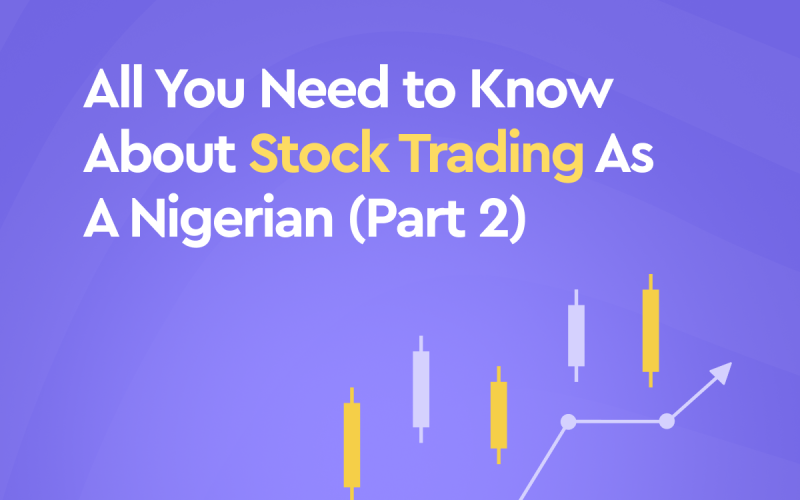In the first part of all you need to know about stock trading as a Nigerian, we examined the basics of stock trading. This includes the definition of stock trading, why stock trading matters, how to start stock trading in Nigeria, the challenges Nigerians face in stock trading, and helpful tips for stock trading. That foundation is important, but it’s only the beginning.
Stock trading goes beyond just buying and selling, as it requires strategy, the right tools, and the discipline to manage risks. This second part takes things a step further to provide you with a deeper understanding of stock trading and help you to make more informed decisions with your money.
NB: Remember, this is not financial advice but educational content to guide you as you continue your trading journey.
Advanced Strategies for Nigerians in Stock Trading
Here are some advanced strategies for Nigerians in stock trading;
- Swing trading vs. long-term investing.
As you continue in stock trading, one of the first choices you will need to make is whether you want to swing trade or invest for the long term. Both approaches can make you money, but they work very differently.
Swing Trading
Swing trading is all about taking advantage of short-term price movements. You buy a stock when the price dips and sell it once it rises within days, weeks, or a few months. The goal is to make quick profits without holding the stock for too long.
Swing trading works best for Nigerians who want active involvement in the market and are ready to learn technical analysis (charts, price trends, candlesticks, etc.).
Long-Term Investing
This strategy is about patience. You buy stocks in companies you believe in and hold them for years, waiting for their value to grow. For example, buying stocks in companies like Apple, Amazon, or Dangote Cement and holding them while the companies expand.
Long-term investing is perfect for those who want to build wealth steadily, without the daily pressure of monitoring price swings.
One may ask which is better?
There’s no “one size fits all.” If you enjoy analyzing the market and are willing to take risks, swing trading may be a suitable option for you. However, if your focus is on building wealth gradually while managing other responsibilities, long-term investing is the safer option.
Some traders even combine both strategies by using swing trading for short-term profits and long-term investing for stability.
- Dividend stocks and passive income.
One of the most effective ways Nigerians can generate income from the stock market without undue stress is through dividend stocks.
What Are Dividend Stocks?
A dividend stock is a share in a company that pays part of its profits to shareholders regularly (quarterly, semiannually, or annually). These payments are called dividends. Instead of waiting for stock prices to rise before making money, you earn income just for holding the stock.
Think of it this way: If you own shares in a company like GTBank, Zenith Bank, or Nestlé Nigeria, you will likely receive dividends every year because these companies have a record of rewarding their shareholders. Some people call it passive income.
- Dollar-cost averaging.
One of the biggest mistakes beginners make in stock trading is trying to time the market and waiting for the “perfect” moment to buy or sell. The truth is that even experts struggle to consistently predict market highs and lows. That’s where Dollar-Cost Averaging (DCA) comes in.
Dollar-cost averaging is an investing strategy where you invest a fixed amount of money at regular intervals (weekly, monthly, or quarterly), regardless of the stock market’s performance. Instead of putting all your money in at once, you spread it out over time.
Stock trading apps for Nigerian Traders
Gone are the days when stock trading in Nigeria felt like something only bankers or the super-rich could do. Thanks to fintech innovation, everyday Nigerians can now buy and sell global and local stocks right from their phones. These trading apps have removed the old barriers by making the process easy, affordable, and accessible.
- Bamboo
Bamboo is one of the most popular apps for Nigerians who want access to both Nigerian and U.S. stocks. With Bamboo, you can invest in companies like Apple, Microsoft, and Tesla, as well as local Nigerian Exchange stocks.
- Trove
Trove is another solid option that allows Nigerians to invest in U.S., Chinese, and Nigerian stocks, as well as ETFs and bonds. This makes it more versatile for those who want to diversify.
- Chaka
Chaka positions itself as the “gateway to global investing.” It provides access to Nigerian stocks, as well as over 4,000 assets across international markets.
- Risevest
Risevest is slightly different from the other apps. Instead of letting you pick individual stocks, it provides curated investment portfolios managed by experts. This is great if you are not confident in picking stocks yourself.
Risk Management Tips for Stock Trading
Here are some risk management tips for stock trading;
- Never Trade with Money You Can’t Afford to Lose
This is rule number one. Don’t use your rent money, school fees, or daily survival funds to trade. Stocks can crash unexpectedly, and if your survival money is tied to them, you will end up stressed and possibly in debt.
- Diversify Your Portfolio
Don’t put all your money into one stock, no matter how promising it looks. Spread your investments across different sectors and even countries if possible. For instance, mix U.S. tech stocks with Nigerian banking stocks, and maybe add ETFs for balance. Diversification reduces the impact if one stock crashes.
- Set Stop-Loss Orders
A stop-loss is like a safety net. You set a limit on how much loss you’re willing to take on a stock, and once it hits that point, the app automatically sells it. This prevents you from holding a losing stock for too long out of emotion.
- Don’t Trade on Emotions
Fear and greed are every trader’s worst enemies. When the market is falling, fear makes people sell too quickly. When it’s rising, greed makes people buy too late. Always make decisions based on research, not feelings.
- Start Small, Scale Up Later
If you are new, start with small amounts until you learn the ropes. Don’t rush into big trades because you saw someone else making quick profits. The stock market rewards patience.
- Stay Educated and Updated
Follow global and Nigerian financial news, watch how companies perform quarterly, and learn from trading communities. Information is power in stock trading. Hence, the more you know, the less risky your decisions become.
- Have an Exit Strategy
It’s not enough to know when to buy; you must also know when to sell. Decide ahead of time whether you are aiming for short-term profits (swing trading) or long-term growth. Having a plan keeps you disciplined.
Conclusion On All You Need to Know About Stock Trading
Stock trading as a Nigerian is now accessible to anyone with a smartphone, internet connection, and the willingness to learn. Stock trading isn’t about luck but about strategy, patience, and discipline. The goal is to grow your wealth while protecting your capital.
Always remember to trade with caution, never risk what you can’t afford to lose, and keep learning. If you stay consistent and disciplined, you will not only survive Nigeria’s tough economy but also build a path to financial freedom.
References;
All You Need to Know About Stock Trading As A Nigerian (Part 1).
If you enjoyed this, read more here;
Differences Between Prepaid Cards And Gift Cards: Which Should You Choose?
Possible eBay Gift Card Errors and How to Fix Them in 2025
How to Redeem a Google Play Gift Card on a Google Play Account
Top 9 Popular Gift Cards in the Philippines
7 Best Gift Cards for Teachers to Show Your Appreciation
Why Do Gift Cards Have Varying Rates?
15 Types of Popular Gift Cards Available in Ghana.
How to use AMEX gift card to make payments on Amazon
American express gift cards everything you need to know about them



